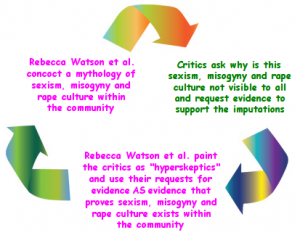A response to the organization Secular Woman
A response to Secular Woman’s article titled “Opportunity and Access in the Freethought Movement” and some assorted reflections on the current state of the online secular community
Secular Woman is an organization, launched in June of 2012, which aims to “amplify the voice, presence, and influence of non-religious woman.” I was initially supportive of the organization and helped promote it because I had hoped that this organization would provide a fresh breath of air to the discussion about women’s issues – something much different than what many have already heard from the likes of radical or gender feminists in the secular community who seem to believe that men, ‘the patriarchy,’ and misogyny are responsible for all or most of the problems women face.
When Secular Woman launched, I interviewed Bridget Gaudette — one the organization’s founders, formerly the group’s Vice President of Outreach (she has since resigned — who had said that the group wasn’t launched because of discussion of sexism and sexual harassment [which was, at the time, and perhaps still is, an ongoing theme of discussion in the online secular community]. The group, as it seemed, was going to focus on attracting more women to the secular movement, but was not going to blame men or ‘the patriarchy’ for the problems women face.
Fast forwarding to Feburary of 2013, Secular Woman has published a piece titled “Opportunity and Access in the Freethought Movement” which postulates that sexism, misogyny, male privilege and ‘the patriarchy’ are responsible for the lack of participation of women in the secular community. In order to overcome the obstacles Secular Woman believes women are facing, they postulate that women should have 60% of leadership roles at all levels of national/regional/local organizations (how’s that for equality?), “be clear and vocal that women and feminist thought are rational,” and recommend that secular organizations “do not tolerate anti-woman rhetoric in [their] presence; speak out against it, immediately, directly, and without equivocation” among other concerns.
Organizations which do not adhere to the recommendations of Secular Woman, as it seems from the end of their article, are similar to those who oppose the Civil Rights Act of 1957,
The decisions you make now for yourself and your organizations are the ones that you will be looking back on in 30 years. Don’t be Strom Thurmond opposing the Civil Rights Act of 1957. Be on the right side of history.
What evidence does Secular Woman put forth to support the idea that women are at such a disadvantage in the secular community?
In a section of the article titled “Reality Women Face in the Secular Movement,” Secular Woman argues that particular quotes, memes, and sentiments “represent some of the vitriol directed at women” and are created to “antagonize women.” Interestingly pictured is a photoshopped image titled CrucifixionPlus(Restored) which was created originally tweeted by Paula Kirby as a response to Atheism+ which was launched by Jen McCreight [pictured] (who has since seemingly withdrawn her support following a mass exodus from Atheism+ and its glaring failure) and supported by Richard Carrier [pictured] who infamously said that people are either ‘with us or against us.’
Apparently, Paula Kirby is representative of “some of the vitriol directed at women” and created tweeted this image to “antagonize women” (or so Secular Woman says). Nevermind the pictured males, of course. Other images linked, “Crazy Cunt Lady” by Franc Hoggle, a parody of the ‘crazy cat lady’ from The Simpsons, mocks Ophelia Benson – someone who writes various blog posts complaining about the use of the word ‘cunt.’ Another image, a Reddit meme coming from who knows who, seemingly has nothing whatsoever to do with the secular community.
Oh, the horror! Images ridiculing people (note: not all women) are posted on the internet! While I am not generally a fan of ridicule and tend not to use ridicule in my approach, I fail to see how these images are leading to — as Secular Woman proposes — misogyny, intimidation, silencing, keeping women from appearing in public, sexism, driving women away from the secular community, or being reluctant to join secular organizations.
First, it’s important to note that ridicule is not exclusively or disproportionately targeted at women. Critics of people like Ophelia Benson — whom Secular Woman included in their post — ridicule people such as Richard Carrier (pictured in this image), PZ Myers (pictured in this image), Greg Laden, ‘Lousy Canuck,’ and many more. Hell, I have even been the target (and still continue to be the target) of ridicule.
How, I wonder, is it possible to demonstrate that people are targeted because they are women? Instead, it seems to be the case that people are ridiculed because others do not approve of their behavior or attitudes. Ridicule — some may argue — may be crass, inappropriate, or not constructive. This is, though, what happens to people who share controversial opinions and is what seems to be the price of being a public figure. Ridicule, though, is not something exclusively targeting women. I was, for instance, the target of ridicule in December of 2009 following being publicly involved in church/state activism.
The ridicule I faced was not because of my gender (although there was some ‘male shaming’ involved), but rather was because people disagreed with me. There is a ‘trolling culture’ on the internet in which people, regardless of their gender, are targeted. People have called me a ‘dickhead,’ ‘not much of a man,’ said that I was ‘not being a real man,’ shamed me for not having a girlfriend, made fun of my appearance including my body size, made derogatory comments about me being gay (although I am straight), called me a ‘dickhead,’ a ‘punk ass,’ told me to ‘beat off with my gay ass boyfriends.’ A fellow college student threatened to “fuck [my] fat face up” and called me a ” fucking inbred atheist piece of shit.” This is only a sample of the hatred I have experienced.
Perhaps others are less assertive, more sensitive, or don’t have a ‘thick skin’ as I do. I understand this. It would be nice to see hatred go away, but it probably will not (and may even get worse). Those who express controversial opinions — no matter the topic — are likely to be subjected to ridicule and hatred.
Secular Woman’s article continues with a section titled “The Argument About What Atheism Really is…” responding to the claim that atheism is only about a lack of belief in god,
The atheism and secularism we are discussing is, in fact, a social movement; not simply a dictionary definition.
Secular organizations do advocate for social (and other) issues that are broader than a lack of belief in any god, including: health and safety, education, tax policy, discrimination, government actions, military, international, complete and total separation of church and state, scientific integrity, human rights for all, promoting peace, reproductive freedom, women’s rights, LGBT rights, civil rights in America, etc.
So, the idea of this purity test fails before it begins.
This ‘argument’ rests on an equivocation; the word ‘atheism’ is used in two different contexts. Atheism is a lack of belief in gods while the ‘atheist social movement’ is something different. ‘Atheist social movements,’ though, do not seem to focus — or at least primarily focus — on many of the issues Secular Woman puts forth unless they are closely related with issues of separation of church and state, improving the visibility of atheists, or similar concerns.
It is interesting that Secular Woman would list “women’s rights” after “human rights for all.” Why separate the two? Aren’t women’s rights included in the subset of “human rights for all?” Why, also, doesn’t Secular Woman talk about how issues facing men including high rates of suicide, homelessness, incarceration, educational barriers and failures, lack of child custody, and unfair family courts? Secular Woman doesn’t talk about issues facing men for the same reason secular organizations do not focus on issues facing women. Secular Woman should address the concerns they put forth rather than dictating what other organizations’ missions should be and seemingly shaming them for not doing so.
The article continues, misrepresenting conclusions from the Secular Census,
Regardless of gender, all respondents who are or have been involved in the secular movement are asked: Have you ever felt unwelcome, discriminated against, or harmed in the secular movement? Women outnumber men 62%/34% in responding “Yes.” It is worth noting that women do not outnumber men when asked the same question about religious organizations with which they’ve been associated. It appears they are less comfortable in secular groups than in the churches they left.
The reasons for feeling unwelcome, discriminated against, or harmed in the secular movement are not outlined in the Secular Census nor does the question itself ask anything about what can be referred to as gender relations. Reasons women feel unwelcome, discrimated against, or harmed can be completely unrelated to gender. Ticking a box in a self-report does not allow one to understand what is going on in someone’s head; there is no elaboration provided for the thought processes which are associated with feelings of discomfort and the like.
Additionally, the reasons can be multifaceted and even if issues relating to gender are a problem, they may only be part of the problem while other reasons — as far as the respondents are concerned — are more important. Secular Woman believes they know the answer to the problems women face when they actually do not and cannot because respondents did not explain their thought processes.
Nearing the end of the article, Secular Woman lists “Specific Action Items for Inclusion of Women in the Secular Movement.”
1.1 Immediate and public consequences for harassment, bullying, and the like.
 I wonder…where are the immediate and public consequences for women who label other women as ‘chill girls’ and ‘sister punishers?’ How about women who claim that women are “parroting misogynistic thought?” How about women who seem to insinuate that some women write to gain the favor of men? Should direct messages like these, from women, be rebuked? How about women calling other women ‘the dumbest person on Twitter?‘ I’m waiting for these “immediate and public consequences.” For Secular Woman, ‘harassment, bullying, and the like’ seems to be a phenomena initiated by men, targeting women; the blinders are on while women who partake in ‘harassment, bullying, and the like’ — seemingly according to the definition Secular Woman provides — get a free pass and are not part of the problem.
I wonder…where are the immediate and public consequences for women who label other women as ‘chill girls’ and ‘sister punishers?’ How about women who claim that women are “parroting misogynistic thought?” How about women who seem to insinuate that some women write to gain the favor of men? Should direct messages like these, from women, be rebuked? How about women calling other women ‘the dumbest person on Twitter?‘ I’m waiting for these “immediate and public consequences.” For Secular Woman, ‘harassment, bullying, and the like’ seems to be a phenomena initiated by men, targeting women; the blinders are on while women who partake in ‘harassment, bullying, and the like’ — seemingly according to the definition Secular Woman provides — get a free pass and are not part of the problem.
1.2 More national leaders consistently speaking out about inclusion, diversity, and women.
The lack of participation of women is not necessarily, by itself, evidence of discrimination/purposeful exclusion. Maybe women just are not interested in being publicly involved in the secular community. This is what appears, anyway, to be the simplest hypothesis – much simpler than the hypothesis that males are purposefully excluding women from participating in the secular community. After all, there are many areas in which males and females have varying levels of participation – and this has nothing to do with gender.
1.3 Increase the number of women to 60% in leadership positions at all levels of national, regional, and local organizations. See study on gender deliberation (available via the Secular Woman website when this presentation is published).
How’s that for equality? I have a better recommendation: appoint people to leadership positions because of their merits and do not favor people of a particular gender. Secular Woman, recommending that women have 60% of leadership positions, intentionally advantages women over men instead of suggesting an even balance. Organizations might consider taking measures to include more women in positions of leadership such as allowing people to apply for leadership positions rather than merely internally appointing. Organizations may release calls for applicants and promote these calls for applicants throughout the secular community. Women are not, if open calls are put forth, excluded from applying or ascending to positions of leadership; there is equality of opportunity.
—
This article is the ‘same old same old’ propaganda from people who continue to assert unsubstantiated claims and believe that the problems women face in the secular community are because of misogyny, sexism, and ‘the patriarchy.’ Secular Woman has transformed from a group interested in advocating for women and working toward equality into an organization which wants to prioritize women and blame men for the problems women face. The false narrative that the secular community is particularly hostile toward women, which unfortunately may lead to fewer women participating in the secular community, is being advanced once again.
It’s time for members of Secular Woman who may have supported the organization from its start, when Secular appeared to be an organization worth supporting, to withdraw their membership. Secular Woman is no longer a fresh breath of air in the conversation surrounding problems women face, but rather is voicing the same narrative we have been hearing from Freethought Blogs and the Skepchick network. This narrative is coupled with a culture of fear and character attacks in which people are afraid to speak up because they will be the next ‘witches of the week’ – targets of character assassination campaigns, lies, personal attacks, and the like. This is the real ‘silencing.’
This is the face of modern feminism – hijacked by those who cast males as the oppressors of women. If feminism really was ‘the radical notion that women are people too,’ I would happily identify as a feminist…but it’s not that. Perhaps it is time to shed the label of feminist and work toward egalitarian concerns. While ‘not all feminists are like that,’ it is very difficult to ignore those with very loud voices and large platforms who are.





Recent Comments